Achievements
College of Arts and Sciences Top Stories of 2019 A look back at a year filled with awards, honors, and accomplishments
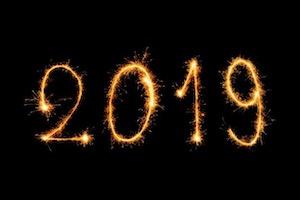
With 2020 just around the corner, it's the perfect time to look back and reflect on some of the incredible things that happened at the College of Arts and Sciences in 2019. Groundbreaking research on cancer and climate adaptation, an award-winning book on domestic violence, AU Museum’s first Corcoran Legacy Collection exhibit, a visit by the country’s leading statistician Nate Silver, and so much more.
Here, in no particular order, is our lineup of fifteen stories that reflect just some of the exciting work going on at AU’s College of Arts and Sciences.
Chimamanda Ngozi Adichie Calls CAS Call of 2019 to Act, Change the World
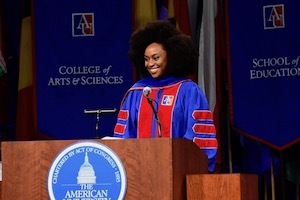 Award-winning writer and speaker Chimamanda Ngozi Adichie received an honorary degree and delivered an inspirational address to the College of Arts and Sciences at the 137th commencement ceremony at American University on May 11, 2019.
Award-winning writer and speaker Chimamanda Ngozi Adichie received an honorary degree and delivered an inspirational address to the College of Arts and Sciences at the 137th commencement ceremony at American University on May 11, 2019.
In all, 506 students earned bachelor’s, master’s and doctoral degrees in fields from economics to literature, history to neuroscience, arts management to public health. The student speaker this year was Charlie Everett, a Frederick Douglass Distinguished Scholar and president of AU PRIDE, the largest LGBTQ organization on campus. Everett was introduced by College of Arts and Sciences Dean Peter Starr, who congratulated the class of 2019 on all their accomplishments, from cutting-edge research on the LIGO Collaboration’s Nobel Prize-winning detection of gravitational waves, to prestigious internships at the World Bank and Smithsonian Institution, to winning Fulbright, Hollings, Gilman, Killam, NSF Graduate Fellowship, and Critical Language Scholarship competitions.
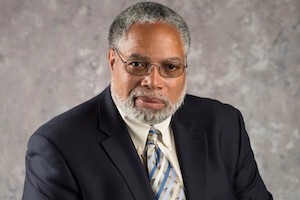 College of Arts and Sciences alumnus Lonnie G. Bunch III (BA history ’74 and MA history ’76) has been appointed the 14th Secretary of the Smithsonian Institution, effective June 16. In this position, he will lead the world’s largest museum, education and research complex, comprising 19 museums, 21 libraries, the National Zoo, nine research facilities, and dozens of education and outreach programs.
College of Arts and Sciences alumnus Lonnie G. Bunch III (BA history ’74 and MA history ’76) has been appointed the 14th Secretary of the Smithsonian Institution, effective June 16. In this position, he will lead the world’s largest museum, education and research complex, comprising 19 museums, 21 libraries, the National Zoo, nine research facilities, and dozens of education and outreach programs.
Bunch's unanimous selection by the Smithsonian’s Board of Regents makes him the first African American to serve in the role of Secretary in its 173-year history. Bunch, who has enjoyed a long and distinguished career at the Smithsonian and other cultural institutions, is currently the founding director of the Smithsonian’s National Museum of African American History (NMAAHC). He says this role has prepared him well for the challenge of leading the Smithsonian into the future, and that he is looking forward to bringing fresh ideas and innovation to the Institution.
Rachel Louise Snyder’s New York Times Top Ten Book Exposes the Truth About Domestic Violence
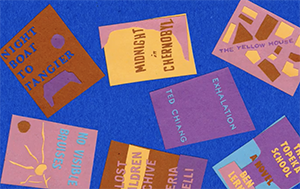 In a groundbreaking new book, American University’s Rachel Louise Snyder takes an unflinching look into the dark corners of our homes and the darker recesses of our brains.
In a groundbreaking new book, American University’s Rachel Louise Snyder takes an unflinching look into the dark corners of our homes and the darker recesses of our brains.
Her forthcoming work, No Visible Bruises: What We Don’t Know About Domestic Violence Can Kill Us, will help rip the lid off a problem that all-too-often remained secret. Make no mistake, Snyder says, this is a US public health issue. And as horrifying as domestic violence can be, it also contributes to many other societal ills.
Update since story was published: No Visible Bruises was named a Top Ten New York Times Book of the Year. It was named one of the best books of 2019 by Esquire, Amazon, Kirkus, Library Journal, Publisher's Weekly, Economist, and New York Times Staff Critics.
Antiracism in Action: Ibram Kendi Offers Hard Truths and Real Solutions
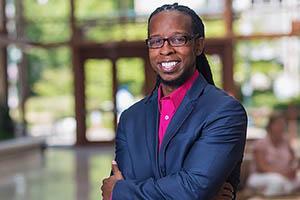 After Ibram X. Kendi published his award-winning history of racist ideas, Stamped from the Beginning, he found readers curious and engaged. But when giving book talks or Q&As, a variation of the same question surfaced again and again: What can we do?
After Ibram X. Kendi published his award-winning history of racist ideas, Stamped from the Beginning, he found readers curious and engaged. But when giving book talks or Q&As, a variation of the same question surfaced again and again: What can we do?
As detailed in a recent Vox piece called “The Great Awokening,” white progressives are increasingly concerned about discrimination and racial inequality. But without broader agreement on what constitutes a racist idea, and what can be done to combat that idea, activists and citizens may be lost. That’s where Kendi saw a need, and he’s filled that need with a brilliant new book, How to Be an Antiracist.
Part memoir-part manifesto, How to Be an Antiracist has something to teach us all. And that does mean everyone, with Kendi detailing how people of any race can hold racist and antiracist views.
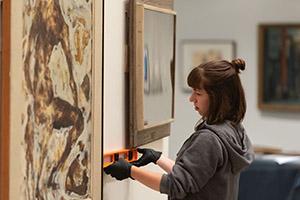 What inspires a major art exhibit?
What inspires a major art exhibit?
Eighteen lucky AU graduate students found out firsthand as they assembled the debut exhibition from the massive art collection donated to American University by the Corcoran Gallery of Art.
The 87-piece show, which opened at the AU Museum this week, is called Moves Like Walter: New Curators Open the Corcoran Legacy Collection. The inspiration behind the show is American art curator Walter Hopps (1932-2005), described by the Washington Post as a "sort of a gonzo museum director — elusive, unpredictable, outlandish in his range, jagged in his vision, heedless of rules."
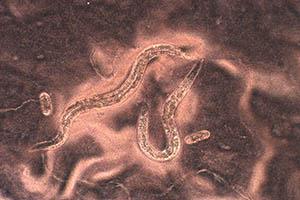 When scientists discovered a worm deep in an aquifer nearly one mile underground, they hailed it as the discovery of the deepest-living animal ever found. Now American University researchers, reporting in Nature Communications, have sequenced the genome of the unique animal, referred to as the ‘Devil Worm’ for its ability to survive in harsh, subsurface conditions.
When scientists discovered a worm deep in an aquifer nearly one mile underground, they hailed it as the discovery of the deepest-living animal ever found. Now American University researchers, reporting in Nature Communications, have sequenced the genome of the unique animal, referred to as the ‘Devil Worm’ for its ability to survive in harsh, subsurface conditions.
The Devil Worm’s genome provides clues to how an organism adapts to lethal environmental conditions. Future research into how it evolved could help humans learn lessons for how to adapt to a warming climate.
AU Orchestra, Chorus, Chamber Singers, Guest Soloists, and Children’s Chorus Perform Grand Premiere
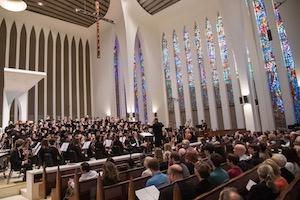 In one of American University’s most ambitious musical performances, more than 200 artists took the stage in front of 800 audience members for the North American premiere of Arnold Saltzman’s A Choral Symphony: Halevi. The combined forces of the AU Symphony Orchestra, Chorus, and Chamber Singers joined the Strathmore Children’s Chorus and guest soloists mezzo-soprano Janice Meyerson and baritone Rob McGinness to perform the hour-long, six-movement choral symphony under the soaring stained-glass windows of the National Presbyterian Church.
In one of American University’s most ambitious musical performances, more than 200 artists took the stage in front of 800 audience members for the North American premiere of Arnold Saltzman’s A Choral Symphony: Halevi. The combined forces of the AU Symphony Orchestra, Chorus, and Chamber Singers joined the Strathmore Children’s Chorus and guest soloists mezzo-soprano Janice Meyerson and baritone Rob McGinness to perform the hour-long, six-movement choral symphony under the soaring stained-glass windows of the National Presbyterian Church.
The performance was made possible by a generous gift from the Eugene M. Lang Foundation in celebration of the life of its founder, Eugene M. Lang.
Dean Peter Starr’s Annual Address Filled with Awards and Accomplishments
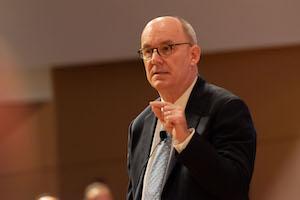 In his ninth annual address, College of Arts and Sciences Dean Peter Starr gathered faculty and staff around him for a town hall meeting packed full of good news about faculty honors and awards, external research funding, fundraising successes, new and growing interdisciplinary research centers, and the bright future of AU science.
In his ninth annual address, College of Arts and Sciences Dean Peter Starr gathered faculty and staff around him for a town hall meeting packed full of good news about faculty honors and awards, external research funding, fundraising successes, new and growing interdisciplinary research centers, and the bright future of AU science.
AU Professor Unraveling The Genetic Causes of Skin Cancer
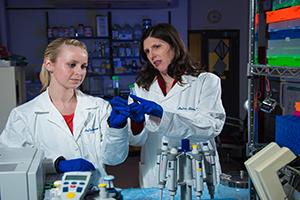 Skin cancer is on the rise in the United States. Squamous cell carcinoma, the second most common form of cancer in the U.S., has the highest mortality rate of all non-melanoma skin cancers. In roughly two to five percent of patients, the disease will metastasize and spread throughout the body, making it difficult to treat.
Skin cancer is on the rise in the United States. Squamous cell carcinoma, the second most common form of cancer in the U.S., has the highest mortality rate of all non-melanoma skin cancers. In roughly two to five percent of patients, the disease will metastasize and spread throughout the body, making it difficult to treat.
American University Associate Professor of Biology Katie DeCicco-Skinner and her colleagues are helping to identify the genetic factors that lead to squamous cell carcinoma. In a new paper, they show how the interaction between a cell signaling pathway called MET and a gene, Tpl2, contributes to skin cancer progression. Their findings indicate a potential target for therapies that could help those suffering from advanced squamous cell carcinoma for whom treatments like radiation and chemotherapy are not options.
Professor David Haaga Wins University’s Top Award: Scholar/Teacher of the Year Award
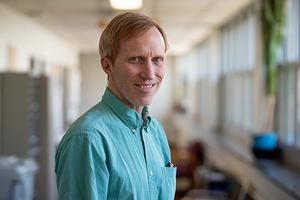 Each year, American University recognizes the exceptional achievements of outstanding faculty, students, staff, and alumni through University Awards. This year, David Haaga, Professor of Psychology and Chair of the Department of Psychology, has won the Scholar/Teacher of the Year Award, the university’s highest honor.
Each year, American University recognizes the exceptional achievements of outstanding faculty, students, staff, and alumni through University Awards. This year, David Haaga, Professor of Psychology and Chair of the Department of Psychology, has won the Scholar/Teacher of the Year Award, the university’s highest honor.
Haaga works in clinical psychology, with a special emphasis on the role of cognitive factors (how people think) in the development and maintenance of psychological difficulties. He is known across campus as a prolific author and an inspiring teacher with an incisive communication style and a dedication to mentoring. As one colleague said, “Dr. Haaga captures students’ attention with his truly remarkable knowledge of our field, his quick wit, and his perfectly suited sports analogies for any scenario.”
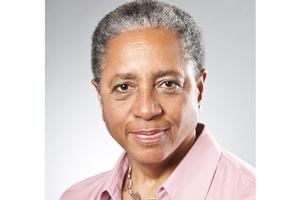 Each year, American University recognizes the exceptional achievements of outstanding faculty, students, staff, and alumni through University Awards. This year, Theatre Professor Caleen Jennings has won the first-ever Faculty Award for Diversity, Equity, and Inclusion.
Each year, American University recognizes the exceptional achievements of outstanding faculty, students, staff, and alumni through University Awards. This year, Theatre Professor Caleen Jennings has won the first-ever Faculty Award for Diversity, Equity, and Inclusion.
In 2016, Jennings became the founding chair of American University’s President's Council on Diversity and Inclusion (PCDI) at a moment when issues of diversity, inclusion, safety, and equity were challenging AU’s campus and community. “Her vision, patience, perseverance, and collaborative spirit helped transform a series of negative incidents on campus to a productive and proactive conversation, laying the groundwork for the ‘Inclusive Excellence’ initiatives that define American University’s future,” says Andrew Taylor, chair of the Department of Performing Arts.
 The National Science Foundation has awarded a grant of $300,000 to American University for an analysis of gender and racial equity among its STEM faculty, with the aim of increasing AU’s number of women and underrepresented minority STEM faculty.
The National Science Foundation has awarded a grant of $300,000 to American University for an analysis of gender and racial equity among its STEM faculty, with the aim of increasing AU’s number of women and underrepresented minority STEM faculty.
The two-year grant will fund a rigorous, university-wide assessment of structures, policies and procedures at AU affecting equity in hiring faculty in science, technology, engineering and math fields. Gender and racial disparities among STEM faculty at medium-sized, urban, private research universities are not well understood; thus, the results of AU’s work will shed light on faculty diversity efforts for peer institutions in urban and metropolitan areas.
Follow the Numbers: Nate Silver Analyzes 2020 Presidential Election
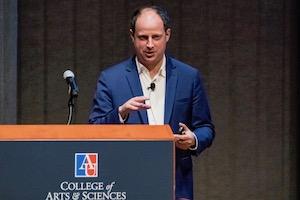 It’s what everyone’s dying to know: Who will win the 2020 election and become the next President of the United States?
It’s what everyone’s dying to know: Who will win the 2020 election and become the next President of the United States?
An overflow audience packed into AU’s Katzen Arts Center last Thursday to hear statistician Nate Silver share his predictions on the Democratic Party presidential primaries and the 2020 presidential race.
Silver, who is famous for analyzing data to predict everything from baseball to elections, is the founder and editor-in-chief of the FiveThirtyEight website and the bestselling author of The Signal and the Noise: Why So Many Predictions Fail—but Some Don't, described by the New York Times as "one of the more momentous books of the decade.”
Center for Israel Studies Receives $2 Million as part of $7 Million Gift from Alan and Amy Meltzer
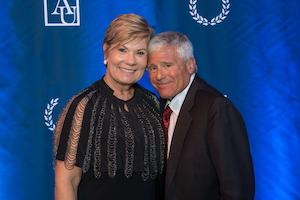 The College of Arts and Sciences’ Center for Israel Studies (CIS) has received $2 million as part of an extraordinary gift of $7 million to American University from Board of Trustees member Alan Meltzer and his wife, Amy.
The College of Arts and Sciences’ Center for Israel Studies (CIS) has received $2 million as part of an extraordinary gift of $7 million to American University from Board of Trustees member Alan Meltzer and his wife, Amy.
The Meltzers also donated $5 million to Athletics, to support the AU Center for Athletic Performance. The Meltzers’ gift to Athletics stands alongside the recently announced $3 million gift from Jack Cassell, SOC/BA ’77, former Board chairman, and his wife, Denise.
CAS Robyn Rafferty Mathias Student Research Winners Announced
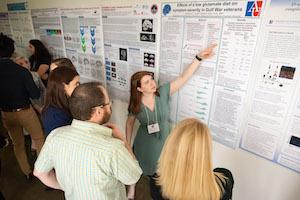 This year’s Robyn Mathias Student Research Conference award winners have been announced. Now in its 29th year, the conference gives College of Arts and Sciences undergraduate, graduate, and doctoral students an opportunity to present original scholarly and creative works in the form of paper and poster presentations.
This year’s Robyn Mathias Student Research Conference award winners have been announced. Now in its 29th year, the conference gives College of Arts and Sciences undergraduate, graduate, and doctoral students an opportunity to present original scholarly and creative works in the form of paper and poster presentations.
The research conference is sponsored in part by a generous grant from the late AU trustee and alumna Robyn Rafferty Mathias as well as by the NASA District of Columbia Space Grant Consortium. It provides a forum for students to present their work before colleagues, faculty, and friends. College of Arts and Sciences students from all disciplines are encouraged to enter, and students in other schools may submit work that was completed in a CAS course.
